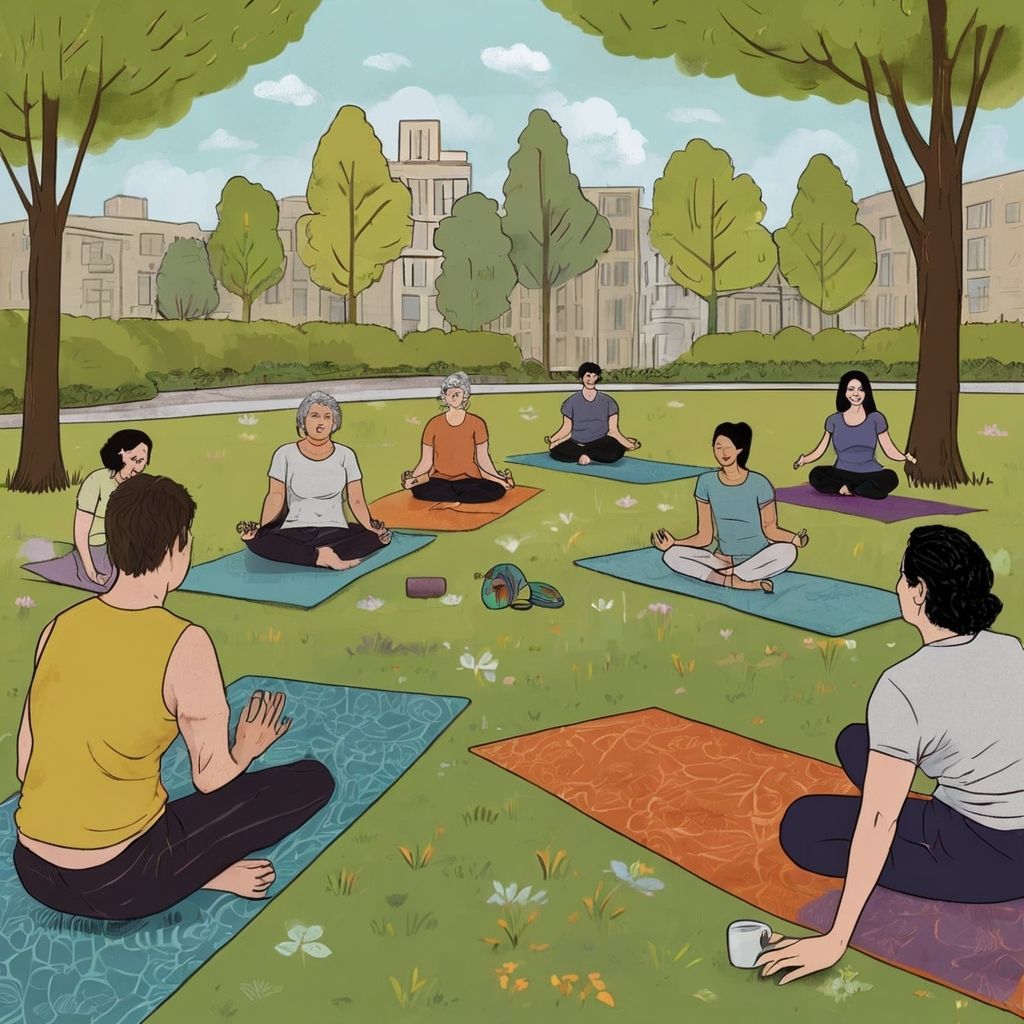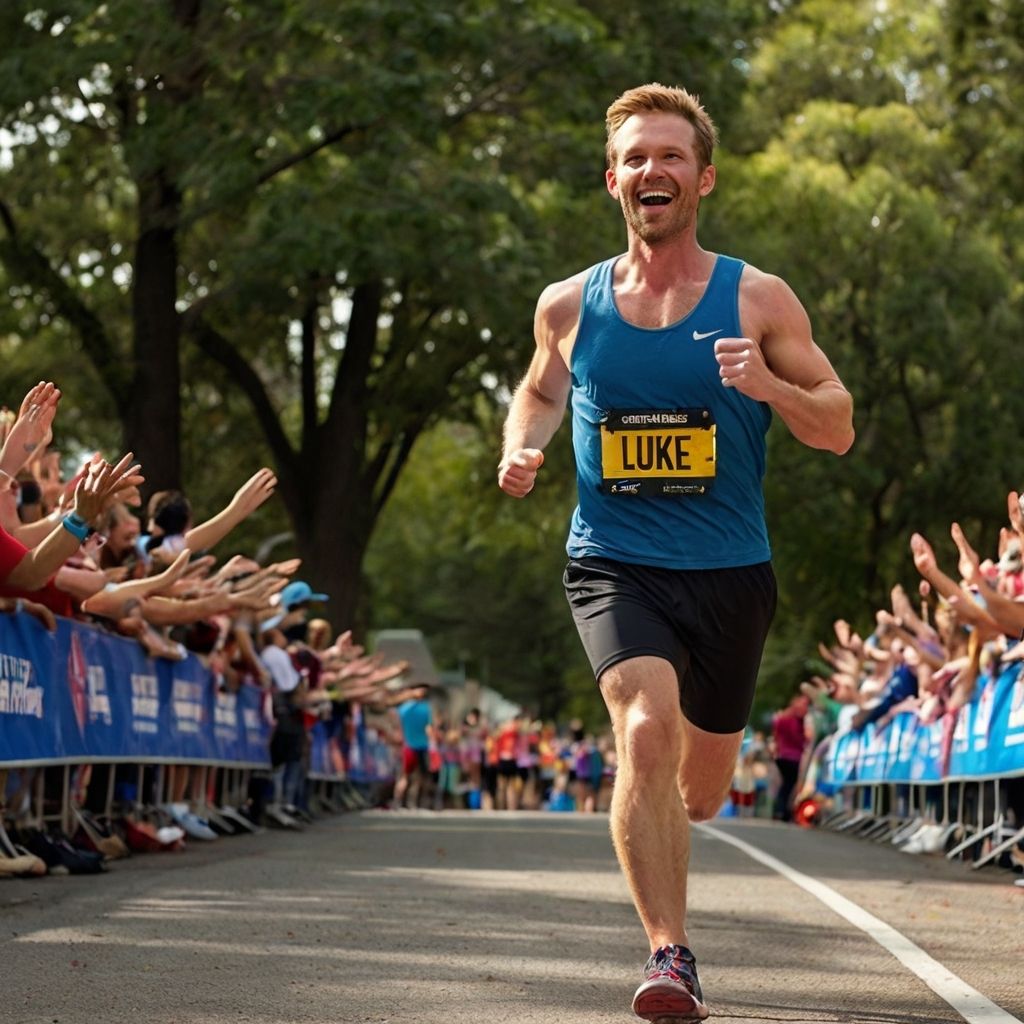- Chuck's Stroke Warriors Newsletter
- Posts
- Goodbye Stress, Hello Life: Your Post-Stroke Comeback Tour
Goodbye Stress, Hello Life: Your Post-Stroke Comeback Tour
The 'Fake It Till You Make It' Path to Calm

Table of Contents
Hey Warriors,
Navigating life after a stroke can be a whirlwind of emotions, challenges, and unexpected turns. I remember feeling overwhelmed and stressed, wondering if things would ever return to normal. But through this journey, I discovered the power of finding calm amidst the chaos. Stress management became a crucial part of my recovery, helping me regain balance and perspective. Today, I want to share some strategies that helped me and can hopefully help you too.
You know, sometimes I feel like my stress levels are higher than my blood pressure ever was. But here's the thing - stress is like that annoying relative who shows up uninvited. We can't always kick it out, but we can learn to deal with it better.
Remember, warriors, it's okay to not be okay all the time. Acknowledging your stress is the first step to managing it. So pat yourself on the back (or wherever you can reach) for recognizing when you're stressed. That's half the battle won!
Here's a personal anecdote: Many years ago, I had a martial arts instructor who always emphasizes the importance of focusing on what you can do, rather than dwelling on what you can't. He would often say 'Do what you CAN do and don't worry about what you cant do'. Just before Christmas of 2022, I found myself fighting being down in the dumps about my state of being after my stroke at the end of 2019. So I decided to start writing, because it was something that I could do. In February of 2023 I wrote my first newsletter, and I have been at it ever since.
---
Updates and Recent Developments
1. Breathing exercises:
Pursed lip breathing: Inhale through nose for 2 counts, exhale through pursed lips for 4 counts[1]
Square breathing: Inhale for 4, hold for 4, exhale for 4, hold for 4[1]
2. Progressive muscle relaxation:
Tighten and relax different muscle groups, starting from feet and moving up to face[1]
Hold each contraction for 5 seconds before releasing[1]
3. Visualization:
Imagine a peaceful, calming environment using all senses[1]
Focus on feeling happy and relaxed in that mental scene[1]
4. Meditation and mindfulness:
Try guided meditation, mindfulness meditation, mantra meditation, or prayer[1]
Focus on the present moment to reduce anxiety about the future
5. Journaling:
Write down thoughts and feelings to process emotions[1]
Can help gain perspective and clarity on situations[1]
6. Open communication:
Talk to family, friends or care providers about your feelings[1]
Express yourself and have your emotions validated
7. Music therapy:
Listen to calming music to reduce stress and depression[1]
8. Physical activity:
Regular exercise helps work off tension and creates feelings of wellbeing[2]
9. Healthy lifestyle habits:
Get enough sleep, eat a balanced diet, limit caffeine intake[2]
Take time for enjoyable activities and hobbies[2]
10. Cognitive coping skills:
Practice problem-solving techniques when feeling overwhelmed[5]
Challenge negative thoughts with more balanced perspectives
11. Set realistic goals and expectations:
Recovery is often a slow process, so be patient and kind to yourself[2]
Celebrate small achievements along the way
The key is finding techniques that work best for you personally. Combining different strategies and practicing them regularly can help manage stress and promote relaxation during stroke recovery. If stress remains overwhelming, consider seeking help from a doctor, counselor or support group[2].
Citations:
Thoughts and Insights

Taming the Stress Beast: Finding Your Zen After a Stroke
So, you've survived a stroke. Congrats, warrior! But now you're facing a new enemy: stress. Let's chat about how to kick stress to the curb and get your mojo back.
Why Stress is a Pain in the Brain
After a stroke, stress can sneak up on you like a ninja. Your body's different, your brain's rewiring, and life's thrown you a major curveball. It's enough to make anyone freak out!
Stress Comes in Flavors
Physical stress:
Think aches, pains, and feeling wiped out.
Mental stress:
Your emotions are on a roller coaster, and your thoughts are doing backflips.
Spotting Stress Before It Spots You
Your body's pretty smart. It'll give you hints when stress is creeping in:
Headaches that won't quit
Muscles tighter than your grandma's tupperware lids
Sleeping like a vampire (awake all night, zonked all day)
Mood swings that'd make a teenager jealous
Why Stress is Your Recovery's Worst Enemy
Stress isn't just annoying – it's a recovery roadblock. It can:
Turn your healing into molasses
Make your brain fog even foggier
Open the door for depression and anxiety to crash your recovery party
Stress-Busting Strategies That Actually Work
1. Get Your Groove Back with Routines
Create a daily schedule that's comfy as your favorite sweats. Predictability = less stress.
2. Snooze Like a Pro
Make your bedroom a sleep paradise. No phones, no worries, just sweet dreams.
3. Eat Like Your Recovery Depends On It (Because It Does)
Feed your brain the good stuff:
Colorful fruits and veggies
Protein powerhouses
Whole grains for the win
4. Move It or Lose It (But Safely)
Exercise is nature's stress-buster. Talk to your doc about what moves are right for you.
Zen and the Art of Stroke Recovery
Mindfulness: Not Just for Hippies
Learning to chill in the moment can work wonders. Try these:
Deep breaths (in through the nose, out through the mouth)
Body scans (focus on relaxing each part of your body)
Guided imagery (picture your happy place)
Your Cheer Squad
Family and Friends: Your Personal Army
Let your loved ones help. They want to, even if they're awkward about it.
Find Your Tribe
Join a support group. Talking to folks who get it can be a huge relief.
When the Pros Need to Tag In
Therapy: Not Just for Couches
Cognitive Behavioral Therapy (CBT): Rewire your brain to stress less
Occupational Therapy: Master daily tasks and feel like a boss again
Hobbies: The Fun Way to Beat Stress
Try something new or rediscover an old passion. Painting, writing, gardening – whatever floats your boat and calms your mind.
Goals: Your Secret Weapon
Set small, doable goals. Knocked one out? Celebrate like you've won the lottery!
When to Call in the Cavalry
If stress is eating you alive, it's time to talk to a pro. Mental health experts and your stroke recovery team are there to help.
Tech to the Rescue
There's an app for everything, including stress management. Find one that clicks with you.
Life After Stroke: Finding Your New Normal
Manage your time like a pro
Find joy in the little things (yes, even folding laundry can be zen)
Dodge Those Stress Bullets
Know your triggers and avoid 'em when you can
When life throws you a curveball, have a game plan
Wrapping It Up
Stress doesn't have to run your life after a stroke. With these tricks up your sleeve, you can find your calm and get back to being you – new and improved.
Quick Q&A(FAQ’s)
Q: How long till I'm stress-free?
A: It's different for everyone, but stick with it. You'll see changes faster than you think.
Q: Can stress cause another stroke?
A: Stress alone probably won't, but it can mess with your blood pressure. Keep it in check!
Q: Got any quick stress fixes?
A: Try deep breaths, put on your favorite tunes, or picture your happy place.
Q: How can my family help?
A: They can lend an ear, help with tasks, and cheer you on.
Q: Do different strokes need different stress-busting?
A: The basics work for everyone, but chat with your doc for a plan that's perfect for you.
Remember, you've already beaten the odds. Stress is just another hurdle, and you've got this!

Tips and Techniques
Stress Busting 101: Chill Out After Your Stroke
Hey there, stroke warrior! Life's thrown you a curveball, but you're still swinging. Let's talk about keeping your cool when things get tough.
1. Dragon Breathing
Imagine you're a fire-breathing dragon (way cooler than being stressed, right?). Breathe in deep through your nose for 4 counts, hold it for 7, then whoosh it out your mouth for 8. Do this a few times, and you'll feel less like torching everything in sight.
2. Chill Out, Muscle by Muscle
Start at your toes and work your way up. Squeeze each muscle group tight, then let it go limp like a cooked noodle. It's like giving your body a stern talking-to, then letting it take a nap.
3. Move It or Lose It
Exercise is like a magic pill for stress, minus the nasty side effects. Even a gentle stroll or some chair yoga can boost your mood. Just check with your doc before you start training for that marathon, okay?
4. Nature's Chill Pill
Get outside and hug a tree (or at least look at one on your phone). Studies show that even pictures of nature can calm you down. Who knew grass could be so groovy?
5. Laugh It Off
Ever heard of laughter yoga? It's a real thing! Start with a fake chuckle, and soon you'll be genuinely cracking up at how ridiculous you sound. It's like tricking your brain into happiness.
6. Mindful Munchies
Next time stress has you reaching for comfort food, slow down and savor it. Focus on each bite like it's the most important thing in the world. It's meditation with snacks – what's not to love?
7. Connect with Your Crew
Don't go it alone, champ. Reach out to other stroke survivors, join a support group, or just call up a friend. Sharing your ups and downs can make the road smoother.
8. Routine is Your Friend
Create a daily schedule that works for you. It doesn't have to be fancy – just having a plan can make life feel less chaotic. Plus, crossing things off your to-do list is oddly satisfying.
9. Get Your Zzzs
Aim for 7-8 hours of quality shut-eye each night. A good night's sleep is like hitting the reset button on stress. If sleep's tricky, try a calming bedtime routine or chat with your doc about options.
10. Ask for Backup
If stress is getting the best of you, don't be afraid to call in the pros. A therapist or counselor can teach you even more tricks to keep calm and carry on.
Remember, managing stress after a stroke is a journey, not a sprint. Some days you'll feel like a zen master, others like a frazzled cat. That's okay! Keep at it, and you'll find your groove. You've got this, stroke survivor – now go show stress who's boss!
Silly Humor Section

Lighten Up with a Laugh
Why did the stressed-out stroke survivor take up yoga?
They wanted to find their inner peace... and outer balance!
What do you call a stroke patient who's mastered deep breathing exercises?
The calm before the storm!
How does a stroke survivor practice mindfulness?
They take things one step at a time... literally!
Why did the anxious stroke patient start journaling?
They wanted to get their thoughts down on paper before they forgot them!
What do you call a stroke survivor who's become an expert at progressive muscle relaxation?
The ultimate "chill" seeker!
Did you hear about the mathematician who’s afraid of negative numbers?
1. He’ll stop at nothing to avoid them. 😄
Speaking of making things up, have you ever tried to make up with stress?
1. It's like trying to reason with a toddler - futile, but sometimes amusing.
I told my therapist I have a fear of speed bumps. She says I need to slowly get over it.
9. Why did the stroke survivor bring a ladder to the art gallery?
Because they wanted to reach new heights in their recovery and find inspiration in every stroke!
Remember, laughter is a great stress reliever, so don't forget to find moments of joy and humor along your journey.
Here are some effective stress management strategies for finding calm and balance in life after a stroke:
1. Practice relaxation techniques:
Deep breathing exercises like pursed lip breathing and square breathing can help reduce tension and promote relaxation[1].
Progressive muscle relaxation, where you tighten and release different muscle groups, can help release physical tension[1].
Visualization and guided imagery can help calm your mind by imagining peaceful scenes[1].
2. Try meditation and mindfulness:
Various forms of meditation, including guided meditation, mindfulness meditation, and mantra meditation can help reduce stress and anxiety[1].
Mindfulness practices help you focus on the present moment rather than worrying about the past or future.
3. Engage in physical activity:
Regular exercise helps work off tension and creates feelings of wellbeing due to the release of endorphins[2].
Choose activities you enjoy and that are appropriate for your physical abilities post-stroke.
4. Communicate openly:
Talk to family, friends, or care providers about how you're feeling[1].
Expressing your emotions and having your feelings validated is important for managing stress.
5. Use journaling:
Writing in a journal can help sort out thoughts and emotions, provide an outlet for expression, and gain perspective on situations[1].
If writing is difficult, explore technologies or alternative methods for journaling.
6. Practice self-care:
Make time for activities you enjoy[2].
Ensure you get enough sleep and maintain a healthy diet[2].
Learn to say "no" to avoid overcommitting yourself[2].
7. Seek professional help:
Discuss any personality or attitude changes with your doctor, a social worker, psychologist, or counselor[2].
Consider stress management courses or therapy to learn additional coping techniques[2].
8. Use humor and positive thinking:
Laughter can help reduce stress and tension[2].
Try to focus on the positive aspects of each day and set achievable goals[2].
Remember that recovering from a stroke is often a long process. Be patient and kind to yourself as you implement these strategies. It may take some time to find the techniques that work best for you, but consistently practicing stress management can significantly improve your quality of life after a stroke.
Citations:
AI Generated Writing and Art
A Moment of Zen: AI-Generated Poem
In the stillness of the mind,
Where worries cease to bind,
Find the peace you seek,
In moments quiet and meek.
Here's a haiku generated by AI to help you remember to take deep breaths:
Inhale peace, exhale
Stress floats away like a cloud
Calm settles within
And now, a moment of zen brought to you by AI-generated art: [Imagine a serene landscape with a calm lake reflecting a colorful sunset sky]

---
Unraveling Recovery: A Love Story in Reverse

Luke's feet pounded the pavement, each step a victory. The finish line of the local 5K loomed ahead, a ribbon of possibility. "You've got this, Stroke Warrior!" Abby's voice cut through the crowd's roar, igniting a final burst of speed. As Luke broke through the tape, time seemed to slow. His arms, once leaden, now raised in triumph. Tears mingled with sweat on his cheeks. This moment, unimaginable mere months ago, wasn't just a personal win—it was a middle finger to fate itself.
"Remember when a marathon meant binge-watching TV shows?" Luke quipped to Abby later, his words flowing with only the slightest hesitation. She laughed, but her eyes shimmered with pride. Just three months earlier, Luke had nervously shuffled into his office for the first time since the stroke. His colleagues had greeted him with a mix of concern and admiration.
"Welcome back, champ," his boss had said, clapping him gently on the shoulder.
During his first presentation, Luke had gripped the podium, willing his rebuilt neural pathways to cooperate. "We've projected a 15% increase in Q3 sales," he'd stated, each word a small triumph. Abby, watching from the back, had beamed brighter than any projector.
Six months before that milestone, their living room had transformed into a battlefield against disability. "Left foot, right foot," Luke had muttered, his face a mask of concentration as he took his first unaided steps. The walker stood neglected in the corner, a rusting reminder of darker days.
"Dance with me," Abby had whispered that night, soft music filling their home. As they swayed together, Luke's balance strengthening with each move, he'd realized that recovery wasn't just about regaining physical abilities—it was about reclaiming life's simple joys.
The path to this point had been arduous. Nine months earlier, frustration had been Luke's constant companion. Speech therapy sessions often ended in tears and thrown pencils. "I c-c-can't do this!" he'd yell, the words he struggled to form betraying him even in anger.
But Abby's patience had been unwavering. "Yes, you can," she'd insist, her voice a soothing balm. "Let's try again." Hour after hour, they'd work on pronunciation, Abby's love evident in every gentle correction and words of encouragement.
A year before, Luke had begun outpatient rehab. The hospital bed dominating their living room served as a daily reminder of how far they'd come—and how far they had to go. Abby juggled caregiving with work, her own exhaustion hidden behind a mask of optimism.
"Look, I moved my toe!" Luke had exclaimed one day, his face lighting up like a child's on Christmas morning. Such small victories became their fuel, propelling them forward when the journey seemed insurmountable.
Rewind further: eighteen months earlier, Luke had opened his eyes in the ICU, the harsh fluorescent lights a stark contrast to the darkness he'd been floating in. Abby's face, tear-stained but smiling, had slowly come into focus. The right side of his body lay unresponsive, a stranger in his own skin. Words danced just out of reach, mocking him with their elusiveness.
Yet in that moment, as Abby squeezed his hand, a fierce resolve had ignited within Luke. This wasn't the end of his story—it was just the beginning of a new chapter.
Dr. Patel had entered, clipboard in hand. "Mr. Thompson, you've had a stroke," she'd explained gently. "But with hard work and dedication, recovery is possible."
"We'll fight this together," Abby had whispered, her words a promise and a battle cry.
Two years ago, on an ordinary Tuesday morning, Luke had kissed Abby goodbye as he left for work. The taste of coffee still lingered on his lips, the weight of his laptop bag familiar on his shoulder. Neither could have foreseen the life-altering event that lay ahead.
"I love you," Abby had called out, a routine farewell that would soon carry the weight of unspoken fears and hopes.
In mere hours, a clot would disrupt the flow of blood to Luke's brain, and their world would be forever changed. But as Luke crossed that 5K finish line two years later, they realized that 'changed' didn't mean 'ended'. It was simply the beginning of an extraordinary journey of resilience, love, and the indomitable human spirit.
Remember, warriors, stress doesn't stand a chance against your resilience. Keep breathing, keep laughing, and keep being awesome!
That's it for this week's newsletter, dear Stroke Warriors! Keep in mind,life doesn't stop after a stroke – it's an opportunity to embrace new experiences. Remember, you are not alone on this journey, you are strong, and together, we can overcome any challenge.. Embrace your rehabilitation with determination, and know that progress is within reach.
Disclaimers
Disclaimer:
The information provided in this newsletter is for general informational purposes only and is not intended to constitute professional advice.
Medical Disclaimer:
The content shared in this newsletter is not intended to be a substitute for professional medical advice.
Accuracy Disclaimer:
While we make every effort to provide accurate and up-to-date information, the content in this newsletter may contain errors, omissions, or inaccuracies.
We hope you found the information valuable and informative.
With the assistance of AI, I am able to enhance my writing capabilities and produce more refined content.
This newsletter is a work of creative AI, striving for the perfect blend of perplexity and burstiness. Enjoy!
🌟 Exciting News! 🌟
We're thrilled to share that Chuck's journey doesn't stop here. If you're curious about the fascinating world of ChatGPT and artificial intelligence and AI's potential for learning and growth, be sure to check out our sister newsletter, "Chuck Learning ChatGPT"! Discover how Chuck is diving into the realms of AI, exploring innovative ideas, and sharing insights that could inspire new perspectives. To join Chuck on this exciting AI adventure, subscribe to "Chuck Learning ChatGPT" at:
🌟 MORE Exciting News! 🌟
We started a YouTube channel, The Stroke Survivor Spot:
Visit it here and Subscribe :https://www.youtube.com/@StrokeSurvivorSpot
Stay curious, stay inspired, and keep embracing new possibilities with us!
As always, if you have any feedback or suggestions, please don't hesitate to reach out to us. If you have a experience that you would like to share you can reach out to us here :
Keep an eye out for our next edition, where we will be sharing inspiring stories of triumph and resilience from our community.
Join the Journey of Hope: Subscribe to our free newsletter and be part of the incredible journey of hope as we share inspiring stories of stroke Warriors like Luke and their triumphs over adversity. Receive exclusive content and valuable insights into stroke recovery and caregiving, all delivered straight to your inbox.
Share the newsletter on your Social Media!
Join us in supporting the Chucks Stroke Warriors community with a newsletter sponsorship. Reach a targeted audience and promote your brand. Limited sponsorships are available, contact us for more information at:
Until next time!
Keep fighting and stay resilient!
With warm regards,
Chuck and the Stroke Warrior Team
Reply